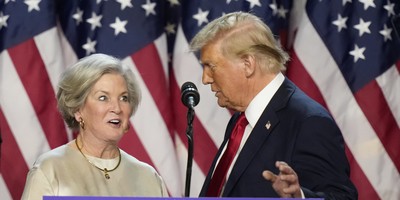WASHINGTON -- When Barack Obama was seeking AFL-CIO support in the primaries, he promised to sign a bill that would effectively deprive workers of a private-ballot vote in unionization drives.
The bill, which is No. 1 on organized labor's wish list, is seen by union bosses as the only way to increase depleted membership rolls because it would be easier to unionize workplaces without the bother of the private ballot to protect workers in a free and democratic election.
Obama doesn't talk about this issue much before general audiences, but it his No. 1 promise when he speaks to unions -- pledging that the so-called Employee Free Choice Act will become law in 2009 if he wins the presidency in November. "We're ready to play offense for organized labor. It's time we had a president who didn't choke saying the word 'union.' A president who strengthens our unions by letting them do what they do best: organize our workers," the freshman senator told the AFL-CIO in Philadelphia on April 2.
"I will make it the law of the land when I'm president of the United States," he told the labor federation.
The labor-law reform is known as the "card-check bill" because it would allow employees to form a union simply by publicly collecting a majority of cards signed by workers supporting unionization of their employer's business. Union leaders would, of course, know how each worker voted, opening them up to pressure and intimidation.
Recommended
Under current law, once a majority of workers submit cards requesting union certification, an election is held where workers vote by secret ballot on whether to ratify unionization. The bill, pushed by labor and supported by Obama, would effectively abandon that procedure in most cases.
John McCain opposes the bill, saying it would deny a democratic right of workers to decide by secret ballot whether they and their co-workers will come under union representation.
The Arizona Republican thinks the card-check bill is nothing more than "a poorly disguised attempt by the labor unions to swell their ranks at the expense of workers' rights and employers."
While both candidates battle for support over critical issues such as the economy and Iraq, the AFL-CIO has made card check its chief obsession. They announced late last month that they were launching "a ramped-up campaign" to make Obama's pledge a reality, beginning with a massive mailing to more than 600,000 union households in the battleground states of Ohio, Michigan, Pennsylvania and Wisconsin.
That will be followed by a "massive campaign" among 13 million union voters in August to promote Obama and highlight his support for the bill. Unions will spend $300 million in the elections -- much of it to promote the card-check bill.
To be sure, business is not sitting idly by while union lobbyists attempt to muscle this bill through Congress. The U.S. Chamber of Commerce is launching the Workforce Freedom Initiative against Big Labor's efforts "to take away the protection of a private ballot, giving union organizers free rein to publicly pressure workers into signing cards stating support for a union. This is un-American," said Chamber president Tom Donohue.
"The obvious intention and design of the bill is to eliminate private ballots as the primary means of certifying unions in this country," said Steven Law, the U.S. Chamber's chief legal officer.
"As a result, it would expose workers to harassment and intimidation by unions and also, arguably, by employers. We have a secret-ballot process because we believe this is the best way to make a choice free from coercion. This is basically an attempt by the unions to be able to do organizing on the cheap," Law told me.
Obama's campaign, however, says this isn't so.
"This is simply a debate over process. But it is up to the workers, and they should be free to choose their process," campaign spokesman Nick Shapiro said. "If they wish to vote by secret ballot instead of a card-check process, they can. The law does not strip them of that right."
But Obama, a lawyer, flatly says the bill "will allow workers to form a union through majority sign-up and card checks" -- bypassing the ballot process. Union leaders have said they prefer this to an election in which employers and unions compete for worker votes.
A national survey of 1,000 registered voters conducted by the Chamber in June found 83 percent were either strongly or somewhat opposed to a system where union organizers "would know which workers voted to join a union and which did not."
The House passed the card-check bill last year, but when it went to the Senate, it fell nine votes short of the 60 votes needed to end a Republican filibuster. With predictions of a six-seat Democratic gain in the Senate this year, Obama Democrats hope they can get just close enough to a 60-vote majority to pass this dangerous and very anti-democratic legislation.

























Join the conversation as a VIP Member